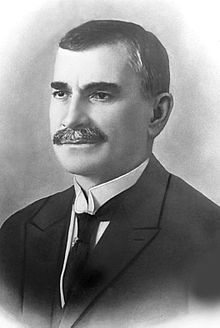Delfim Moreira
|
His Excellency Delfim Moreira |
|
|---|---|
 |
|
| 10th President of Brazil | |
|
In office 15 November 1918 – 28 July 1919 |
|
| Vice President | None |
| Preceded by | Venceslau Brás |
| Succeeded by | Epitácio Pessoa |
| 8th Vice President of Brazil | |
|
In office 28 July 1919 – 1 July 1920 |
|
| President | Epitácio Pessoa |
| Preceded by | Urbano Santos |
| Succeeded by | Bueno de Paiva |
| 13th Governor of Minas Gerais | |
|
In office 7 September 1914 – 7 September 1918 |
|
| Preceded by | Bueno Brandão |
| Succeeded by | Artur Bernardes |
| Personal details | |
| Born |
7 November 1868 Cristina, Minas Gerais, Empire of Brazil |
| Died | 1 July 1920 (aged 51) Santa Rita do Sapucaí, Minas Gerais, Brazil |
| Nationality | Brazilian |
| Political party | Minas Gerais Republican |
Delfim Moreira da Costa Ribeiro (Portuguese: [dewˈfim moˈrejrɐ da ˈkɔstɐ riˈbejru]; 7 November 1868 – 1 July 1920) was a Brazilian politician who served as 10th President of Brazil. He was born in Minas Gerais state to a Portuguese father and to a Portuguese Brazilian mother who traced her ancestry back to the early settlers of Brazil.
Delfim Moreira, elected vice president under Rodrigues Alves in 1918, provisionally ruled the country as the Brazilian Constitution provided for new elections in case of disability of the President before completing two years in office. Rodrigues Alves never even entered office, for he was stricken by the "Spanish flu" and died on 16 January 1919. Delfim Moreira himself also did not have good health, suffering from some psychological conditions, therefore his short tenure was known as "the republican regency" since the government Minister of Transportation and Public Works, Afrânio de Melo Franco, stood out in the president's decision-making.
Three days after the new government took over the country, a general strike hit the capital and the city of Niterói. The president ordered the closure of unions in Rio de Janeiro, on 22 November.
On 21 June 1919, a dissident faction of the anarchists founded the Brazilian Communist Party. Four months later, the government expelled from the country about a hundred of them, mostly foreigners, who worked in the workers movement of the cities of São Paulo, Santos, Rio de Janeiro and Niterói, due to the discovery of an alleged plot aimed at overthrowing the government.
...
Wikipedia
